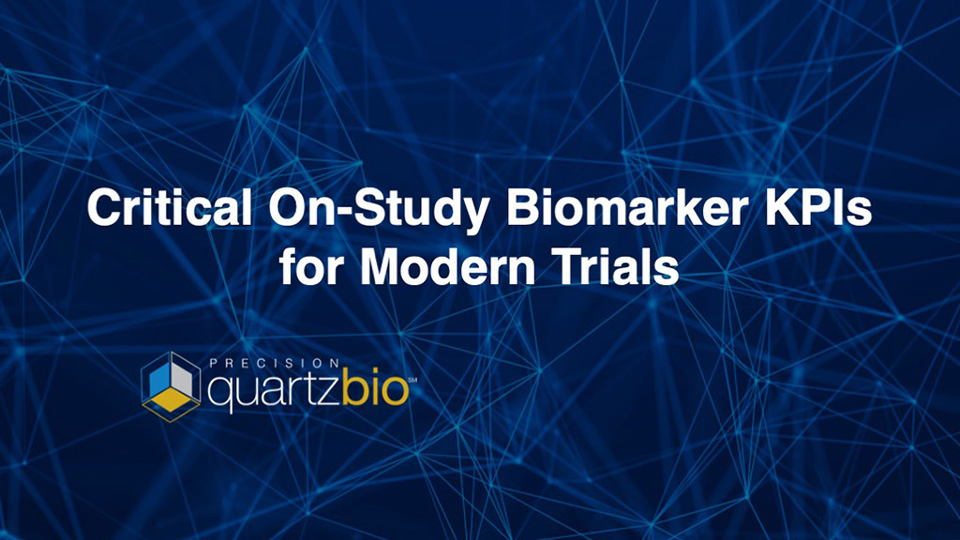
September 24, 2020 — The COVID-19 pandemic has forced clinical trial stakeholders to rethink the paradigm as sponsors adapt to site restrictions, remote monitoring, and updated regulatory guidance. This is especially true in precision medicine programs, which have developed global footprints in order to reach targeted patient populations and rely on specialty labs running complex assays to assess safety, characterize patient response and drug MoA, and provide insights into efficacy. In the absence of consistent and predictable in-person presence, how can sponsors maintain the timely visibility necessary to optimize operations of these complex trials?
One critical challenge is the chain of events that starts with sample collection at sites, follows sample movement to central and/or specialty labs, and culminates in assays being run to generate complex biological data for on-study and broader insight generation. In many ways, this value chain highlights the critical links between trial operations, translational science, and clinical development (and is arguably at the heart of biomarker-centric development). Yet, traditional clinical trial management systems like EDCs (covering patient data) or CTMS (covering document management, payments, and the like) are not well suited to delivering on-study visibility and actionable insights within this realm of translational studies.
Our team has identified three key areas that span site performance, sample availability, data availability, data quality, and translational intelligence that are critical to today’s biomarker-centric clinical trials:
Visibility into sample collection and processing: including performance by sample type, cohort, and site: confirming the right samples to the right lab at the right time should be viewed on executive dashboards alongside KPIs like enrollment status
Biomarker data availability and data quality: sponsors make significant investment in generating complex biomarker data because of the depth of insight it can enable, and it is critical to maintain insights into assay and batch specific performance throughout a study, as well as general data availability to meet scientific objectives
Delivering translational intelligence: once integrated, effectively analyzing the millions of data points to distill key insights across operations, science, and beyond – leveraging dashboards and tools that deliver actionable intelligence. This spans on-study performance evaluation (e.g. dose escalation meetings) through understanding mechanisms of response and informing strategic development decisions more broadly.
Of course, much of the information necessary to deliver translational intelligence exists today – though it is dispersed across workstreams (e.g. sample, assay, translational, clinical, data management) and stakeholders (e.g. CROs, sites, labs, sponsors) and systems (e.g. EDC, CTMS, LIMS). As a result, attaining visibility is a laborious, manual, and ad hoc exercise diverting attention from gaining insights from the collected data.
In the coming weeks, our team will highlight the opportunity to integrate and centralize data, the unique challenges that have historically faced the industry and how overcoming these roadblocks can unlock transformative insights. We’ll highlight best practices for how to link across these disparate stakeholders, systems (and data), and workstreams to develop actionable intelligence and a single source of truth for today’s global teams, global operations, and scientists who depend on the data to accelerate programs.
Topics to be discussed include:
- Biomarker Operations KPIs: critical metrics for today’s operating environment that span sample quality, site performance, and data availability to address the needs of clinical operations, translational science, and data management – plus WHY they matter
- Data: sorting through the mountains of potentially invaluable information that reside in EDCs, LIMS and other technology platforms and HOW to “connect” across systems while addressing the challenges of disparate, disconnected data silos spanning multiple continents and jurisdictions
- Insight generation: drawing insights from exploratory data to identify biological signatures associated with response and drug exposure to delivering translational intelligence today, not waiting for solutions that may accelerate access to translational intelligence years in the future
- Data security and compliance: aligning with a global regulatory environment and protecting sensitive data
Author: Scott Marshall, PhD | Managing Director | QuartzBio, Part of Precision for Medicine

